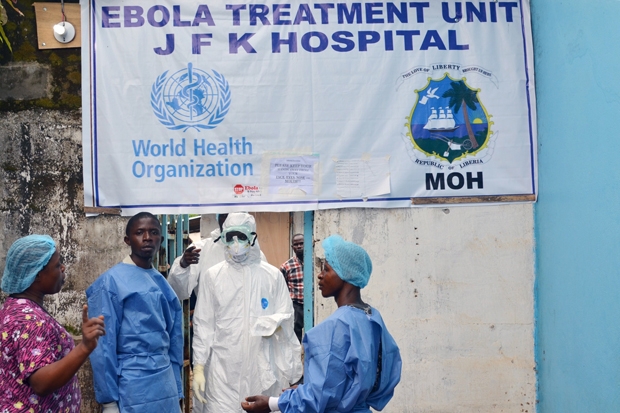I don’t think I can remember a time when there have been so many scares about. They come at us from every direction, and even sometimes from out of the blue, with names we’ve never heard before. Take Isis, for example, or maybe Isil (there’s not even now a consensus on what to call it). Yet neither name was known to any normal, newspaper-reading person until it was already in control of half the Middle East and beheading western hostages at will. Now the Prime Minister says that we must bomb the Islamic State in Iraq because it threatens our security at home. How can such a powerful and terrifying organisation appear on the scene so suddenly and without warning?
Ebola is not such a novelty — the virus was first identified in 1976 — but the idea that we are all threatened by it is new enough. In the 37 years between that of its discovery and 2013, the World Health Organisation reported 1,716 cases of Ebola, all of them in Africa. As of this month, there have not only been 8,376 cases in west Africa alone, more than 4,000 of them resulting in death, but the odd case also popping up in Spain and the United States. The disease is now bound to arrive in Britain as well, we are assured. There will be health checks at airports on passengers arriving from west Africa, and operators on the NHS 111 helpline are being asked to screen callers for possible symptoms of the disease.
Is all this Ebola anxiety justified? It would be nice to think not, but even the usually sceptical science writer Matt Ridley, who said in his column in the Times this week that he doesn’t often find himself agreeing with apocalyptic warnings (which is certainly true over climate change, which he either believes isn’t happening, or that it doesn’t matter if it is — I forget which), but that the west African Ebola epidemic ‘deserves hyperbole right now’. If we don’t win the battle against Ebola in west Africa, he wrote, ‘then we are not facing paper tigers such as Sars or bird flu, but something much more like the great plague of Justinian in AD 541, or the Black Death eight centuries later’.
Add to these sudden scares the slower-burning ones — war in Ukraine, recession in Europe, global warming, Ed Miliband, Nigel Farage — and the future begins to look alarming; even more so if you take seriously the unending cacophany of health warnings issued by the media. One of the reasons for the Daily Mail’s continuing success in this bleak period for newspapers is its commitment to keeping its readers in a state of constant anxiety about their health. They seem to lap it up, their own wellbeing, or lack of it, being of greater interest to them than any international catastrophe.
The big problem is how to avoid being got down by such a multitude of scares, and my solution is just to pick on one scare and concentrate on that, to the exclusion of the others. It should be the sort of scare that the experts regard as real, but that is also very difficult to feel alarmed by. My choice, therefore, is the Quagga mussel. You will no doubt have read about this weird Ukrainian variety of mussel: how it breeds manically and piles up in heaps inside pipes, blocking them and causing floods; how it filters huge quantities of water, depriving it of the nutrients on which other aquatic creatures depend; and how the discovery of one such mussel in a reservoir near Heathrow presages an ‘environmental catastrophe’ for British rivers.
This would, of course, be very sad if it happened; but it is difficult to feel frightened by a mussel, especially by one with such an absurd name. This particular stripy kind of mussel was only identified in 1991 and was called Quagga after a long extinct subspecies of African zebra, there already being a Zebra mussel of similar appearance in existence. The zebra-type animal, with stripes only on the front part of its body, which died out in 1883, was named Quagga after its call, which apparently sounded like ‘kwa-ha-ha’. Hardly an appropriate name for a mussel!
Furthermore, one cannot help wondering, if the predictions are correct, why Ukraine, whence the Quagga mussel comes, and all the other countries between Ukraine and Britain, have not already suffered the devastation of their rivers and water supplies that is supposed to be about to happen here. So try focusing on the Quagga mussel, and see if that helps you to relax.






Comments